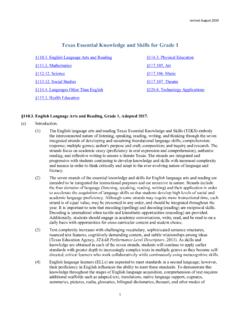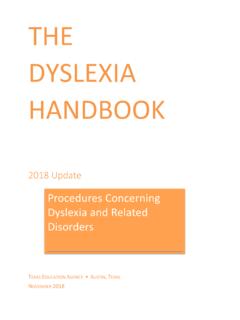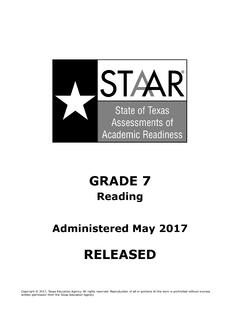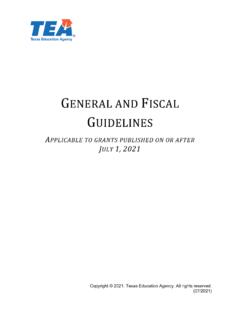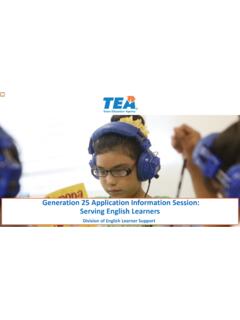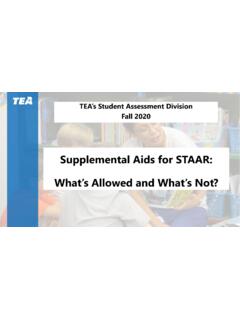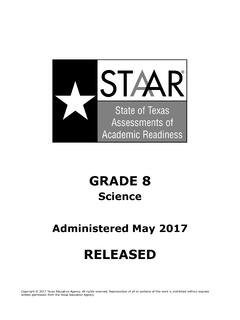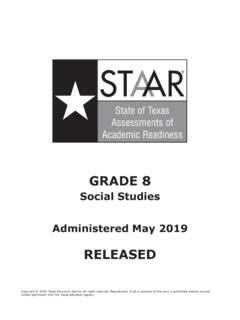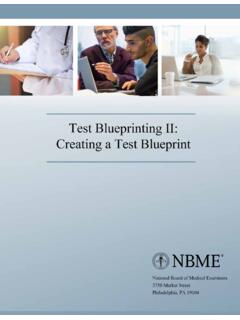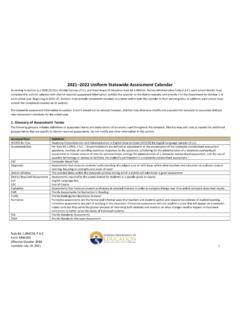Transcription of The Language Proficiency Assessment Committee (LPAC) …
1 2020 2021 The Language Proficiency Assessment Committee (LPAC) Decisions Educator Guide P a g e 1 | 13 Table of Contents OVERVIEW .. 2 TEST PARTICIPATION DECISIONS STAAR, STAAR SPANISH, OR STAAR ALTERNATE 2 .. 3 STAAR .. 3 STAAR 3 STAAR Alternate 2 .. 3 TEST PARTICIPATION DECISIONS TELPAS OR TELPAS ALTERNATE .. 4 TELPAS Holistically Rated Assessments .. 4 TELPAS Online Assessments .. 5 TELPAS Alternate Holistic Inventory .. 6 STAAR DESIGNATED SUPPORTS DECISIONS .. 7 LPAC Responsibilities with Designated Supports Decisions .. 7 Designated Supports: Instructional Use and Assessments .. 7 Designated Supports and Reclassification .. 8 TELPAS DESIGNATED SUPPORTS DECISIONS .. 8 OTHER Assessment DECISIONS .. 8 STAAR Exemption .. 8 STAAR English I Special Provision .. 8 Qualifying as an Unschooled Asylee or Refugee .. 9 DOCUMENTING AND COMMUNICATING DECISIONS.
2 10 APPENDIX A: LPAC DOCUMENTATION FORMS .. 11 PART I: STAAR Participation, Designated Supports, and Justification .. 11 For Grades K 5 .. 11 For Grades 6 12 .. 12 PART II: TELPAS Participation and Documentation .. 12 Part III: Notes .. 12 Part IV: LPAC Signatures .. 13 APPENDIX B: COMMON QUESTIONS ABOUT ASYLEES AND REFUGEES .. 13 P a g e 2 | 13 OVERVIEW This Texas Education Agency (TEA) publication is designed to guide Language Proficiency Assessment committees (LPACs) in making Assessment and designated supports decisions for English learners (ELs) participating in the Texas Assessment program. All ELs (with few exceptions) are required to participate in the State of Texas Assessments of Academic Readiness (STAAR ) and the Texas English Language Proficiency Assessment System (TELPAS). The procedures in this publication implement the EL Assessment requirements for STAAR in Chapter 39 of the Texas Education Code (TEC) and Chapter 101, Subchapter AA, Division 1, of the Texas Administrative Code (TAC) and for TELPAS and TELPAS Alternate in Section of the TAC.
3 These regulations require LPACs to make Assessment decisions in accordance with administrative procedures established by the TEA. In fulfilling their responsibilities, LPACs must adhere to the administrative procedures in this guide, make Assessment decisions on an individual student basis, work as a Committee to make decisions, and maintain required documentation. The role LPACs have in making Assessment decisions for ELs supports appropriate implementation of both the content area Texas Essential Knowledge and Skills (TEKS) and the Texas English Language Proficiency Standards (ELPS). In addition to making Assessment decisions, LPACs are also required to determine and document the number of school years in which an EL has been enrolled in a school. This information, which is reported to the TEA in conjunction with TELPAS and TELPAS Alternate, is used in reporting and accountability and performance-based monitoring measures.
4 It is vital that LPACs follow state-defined policies and procedures to determine and annually document this important data element. See the Other LPAC Resources section of the Language Proficiency Assessment Committee Resources webpage for instructions. Education service centers are required to provide school districts with annual training on LPAC procedures for making EL Assessment and accommodation decisions. P a g e 3 | 13 TEST PARTICIPATION DECISIONS STAAR, STAAR SPANISH, OR STAAR ALTERNATE 2 The STAAR program encompasses STAAR, STAAR Spanish, and STAAR Alternate 2. The STAAR program for grades 3 8 includes assessments of mathematics, reading, writing, science, and social studies. STAAR end- of- course (EOC) assessments are available for Algebra I, Algebra II, English I, English II, English III, Biology, and history . LPACs must make and document test participation decisions in accordance with STAAR program requirements.
5 All ELs (with few exceptions) are required to participate in one of the following academic assessments. For more information on exemptions for student participation in the STAAR program, refer to the Other Assessment Decisions section. STAAR (grades 3 8 and EOC) General statewide Assessment Designated supports available for students who meet eligibility found on the Accommodation Resources webpage Taken by ELs not eligible for an Assessment listed below STAAR Spanish (grades 3-5) Available for students in grades 3 5 for whom a Spanish version of STAAR most appropriately measures their academic progress Designated supports available for students who meet eligibility found on the Accommodation Resources webpage Not permitted for an EL whose parent or guardian has declined bilingual/ESL program services STAAR Alternate 2 (grades 3-8 and EOC)
6 Available for students receiving special education services, including those who are ELs, who meet requirements for an alternate Assessment based on alternate achievement standards Participation requirements and information regarding available accommodations can be found the STAAR Al ternate 2 Resources webpage. In the case of an EL who receives special education services, the LPAC is responsible for working in conjunction with the student s admission, review, and dismissal (ARD) Committee to make and document Assessment participation decisions. The decision may be made by key members of each Committee if necessary. In making STAAR Assessment decisions, LPACs should keep in mind that STAAR Spanish, in addition to being appropriate for students in bilingual programs who are receiving most of their academic instruction in Spanish, may sometimes be appropriate for an EL in an English as a second Language (ESL) program.
7 Examples: a Spanish speaker who has recently moved to the an EL who recently moved from a campus with a Spanish bilingual education program to a campus with only an ESL program a student in an ESL program who receives substantial academic support in Spanish It is recommended that LPACs make final Assessment decisions as close as possible to the time of the test administration to take into account the student s progress in learning English. P a g e 4 | 13 TEST PARTICIPATION DECISIONS TELPAS OR TELPAS ALTERNATE All ELs are required to be assessed annually with one of the following ELP assessments until they meet English learner reclassification criteria and are reclassified as non-LEP/English proficient. This requirement includes ELs classified as limited English proficient (LEP/EL) in the Public Education Information Management System (PEIMS) whose parents have declined bilingual/ESL program services (PEIMS Parental Permission Code C).
8 The TELPAS program encompasses TELPAS and TELPAS Alternate. Both programs assess the English Language Proficiency of English learners in four Language domains: listening, speaking, reading, and writing. LPACs are responsible for making and documenting participation decisions. In the case of an EL who receives special education services, the LPAC is responsible for working in conjunction with the student s ARD Committee to make and document Assessment participation decisions. For ELs in kindergarten through grade 2 who do not have ARD or Section 504 committees, the LPAC is not required to meet to determine participation decisions regarding unmodified English Language Proficiency assessments. TELPAS Holistically Rated Assessments TELPAS holistically rated assessments are based on student classwork and ongoing classroom observations of students in daily instruction.
9 For these assessments, trained teachers use Proficiency level descriptors (PLDs) from the ELPS to determine students English Language Proficiency levels. K 1 (all domains) For K 1, listening, speaking, reading, and writing are holistically rated. 2 12 Writing For 2 12, teachers use collections of classroom-based student writing when assessing the English Language writing Proficiency of students. Students Receiving Special Education Services ELs receiving special education services should be evaluated relative to how well they are able to understand and use English to access the general curriculum at their enrolled grade level in accordance with their individualized education program (IEP). Participation must be considered on a domain-by-domain basis. The reason for not assessing the student must be well-supported and documented in the student s IEP by the ARD Committee and in the student s permanent record file by the LPAC.
10 With rare exceptions, students should be able to be observed and rated meaningfully in each holistically rated domain. If the LPAC and ARD Committee collaboratively decide that an Assessment is inappropriate because of a student s particular disability, the decision is recorded at the time of testing, and the student is not holistically rated in the applicable domain. This non-participation decision is applicable only for an EL receiving special education services who is not eligible for TELPAS Alternate. P a g e 5 | 13 TELPAS Online Assessments The TELPAS reading and TELPAS listening and speaking tests for grades 2 12 are designed to determine where ELs are on the continuum of English Language reading, listening, and speaking Proficiency as a measure of annual student progress. Because the span of reading, listening, and speaking abilities is so broad and the purpose is to measure annual growth in English acquisition, these assessments should be appropriate for the vast majority of ELs who receive special education services.

